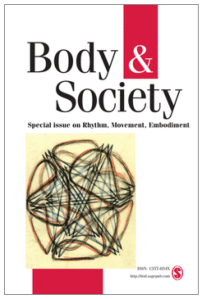 “There is never a body as such…a body is its movement”
“There is never a body as such…a body is its movement”
Body & Society has just announced a special edition of it’s journal, with a large part devoted to movement and phenomenology (link to contents page here).
The edition features a number of important writers on the philosophy of movement, but I wanted to draw your attention to some new work from Erin Manning – author of the brilliant book ‘Relationscapes‘ which offers an amazing critical analysis of movement.
I’ve included abstracts and keywords to the four main articles that concentrate on Manning’s critique of Merleau-Ponty’s phenomenology and Alfred North Whitehead’s process philosophy.
Note, there is additional material to support the readings here.
Wondering the World Directly – or, How Movement Outruns the Subject
Erin Manning erin.manning@concordia.ca
Turning to the moment when phenomenology (Maurice Merleau-Ponty) meets process philosophy (Alfred North Whitehead), this article turns around three questions: (a) How does movement produce a body? (b) What kind of subject is introduced in the thought of Merleau-Ponty and how does this subject engage with or interfere with the activity here considered as ‘body’? (c) What happens when phenomenology (Merleau-Ponty) meets process philosophy (Alfred North Whitehead)? and builds around three propositions (a) There is never a body as such: what we know are edgings and contourings, forces and intensities: a body is its movement (b) Movement is not to be reduced to displacement (c) A philosophy of the body never begins with the body: it bodies.
Keywords: body, movement, phenomenology, process philosophy, subject
Wonder, Movement and Becoming: Response to Erin Manning
Stamatia Portanova stamatia.portanova@googlemail.com
This response experiments with the practice of the interval, in order to performatively write in the little perceptual and cognitive gaps opening between the act of reading Erin Manning’s article ‘Wondering the world directly’, and the gesture of looking at the sky. The idea of the interval is in fact taken directly from Manning’s piece, together with Whiteheadian concepts such as ‘prehension’, ‘superject’, ‘nexus’, ‘eternal object’ and ‘society’. The aim is to respond to the way Manning’s writing amplifies the experience of cloud watching by proposing an elision of consciousness from the experience itself, and by replacing subjectivity with the more-than-human magic of ‘wondering the world’. It is, therefore, thanks to the reading of Manning’s article, that the experience of looking can reveal itself as a ‘becoming-cloud’. This response tries to also give something in conceptual exchange.
Keywords: clouds, movement, perception, process philosophy
Thinking in Movement: Response to Erin Manning
Maxine Sheets-Johnstone msj@uoregon.edu
This review of Manning’s article wonders at the wonder that Manning describes. It does so first in broad terms that question the experience of wonder that Manning describes and goes on to wonder specifically about her understanding of the experienced realities of thinking in movement. In the course of doing so, the review questions her sweeping away ‘the subject’; questions her hard-and-fast distinctions between phenomenology and Whitehead’s metaphysics and voices wonder about her neglecting complementarities between phenomenology and Whitehead’s metaphysics; questions the validity of her claims about ‘where phenomenology goes wrong’; wonders about the absence of kinesthesia and its qualitative dynamics in what she writes of human movement; and finally wonders about her non-substantiated claims about ontogeny.
Keywords: phenomenology, subject, thinking in movement, Whitehead’s metaphysics, wonder
A Phenomenology of/with Total Movement: Response to Erin Manning
Jodie McNeilly jodie.mcneilly@gmail.com
In ‘Wondering the world directly’, Erin Manning criticizes phenomenology by drawing upon Merleau-Ponty’s reflections on the problems of his own project and the criticisms of José Gil. Manning claims that phenomenology goes ‘wrong’ in its privileging of the subject and processes of intentionality: the ‘consciousness–object distinction’. While phenomenology on this understanding alone is inadequate to account for movement and the body, process philosophy has the ‘ability to create a field for experience that does not begin and end with a human subject’. This article responds to Manning’s criticism by arguing that phenomenology never intended to perpetuate a concept of subject that fixes an inexorable gap between itself and objects. A historical assessment of subjectivity and intentionality in the work of five different authors, alongside critical points that address Manning’s misconstrual of phenomenology, leads to an understanding of movement that need not ‘outrun the subject’ or become a precarious limit to perceptual experience because of its primacy.
Keywords: body, Edmund Husserl, intentionality, Erin Manning, movement, phenomenology, subjectivity
Leave a Reply
You must be logged in to post a comment.